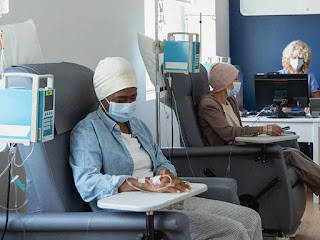Brain tumors: abnormal growths in the brain that can cause a range of symptoms depending on their location and size, including headaches, seizures, and changes in cognitive function.
Brain
tumors are abnormal growths or masses of cells that form within the brain
tissue. They can be cancerous (malignant) or noncancerous (benign). The exact
cause of most brain tumors is not known, but risk factors such as exposure to
radiation and certain genetic disorders may increase the risk.
The
treatment for brain tumors depends on several factors, such as the size, type,
and location of the tumor, as well as the patient's overall health and medical
history. The goal of treatment is to remove the tumor or to control its growth
and manage symptoms. Here are some common treatment options for brain tumors:
1. Surgery: Surgery is often the first treatment option for brain
tumors, particularly if the tumor is located in a part of the brain that can be accessed safely. The surgeon will remove as much of the tumor as possible without causing damage to surrounding healthy tissue. Sometimes, a biopsy may be done to determine the type of tumor before surgery.
2. Radiation therapy: Radiation therapy uses high-energy radiation
to kill cancer cells and shrink tumors. It is often used after surgery to kill any remaining cancer cells that may not have been removed during surgery. In some cases, radiation therapy may be used as the primary treatment if surgery is not possible.
3. Chemotherapy: Chemotherapy involves the use of drugs to kill
cancer cells. It is usually used in combination with radiation therapy, particularly for certain types of brain tumors. The drugs may be given orally or injected into a vein.
4. Targeted therapy: Targeted therapy uses drugs that specifically
target cancer cells based on their genetic characteristics. This type of therapy is often used for certain types of brain tumors.
5. Immunotherapy: Immunotherapy uses the body's immune
system to fight cancer cells. This type of therapy is still being researched for brain tumors, but some early studies have shown promising results.
I need
to clarify that homeopathy has not been scientifically proven to be an
effective treatment for brain tumors. Homeopathy is an alternative medicine
that uses highly diluted substances to stimulate the body's natural healing
process. However, there is no scientific evidence to support the use of
homeopathy as a treatment for brain tumors.
Unani
medicine is a traditional medicine system that originated in ancient Greece and
is based on the teachings of Hippocrates. While Unani medicine has been used to
treat various conditions, there is no scientific evidence to support its use as
a treatment for brain tumors. Brain tumors are a serious medical condition that
requires immediate medical attention and should not be treated with alternative
medicine alone.






No comments:
Post a Comment